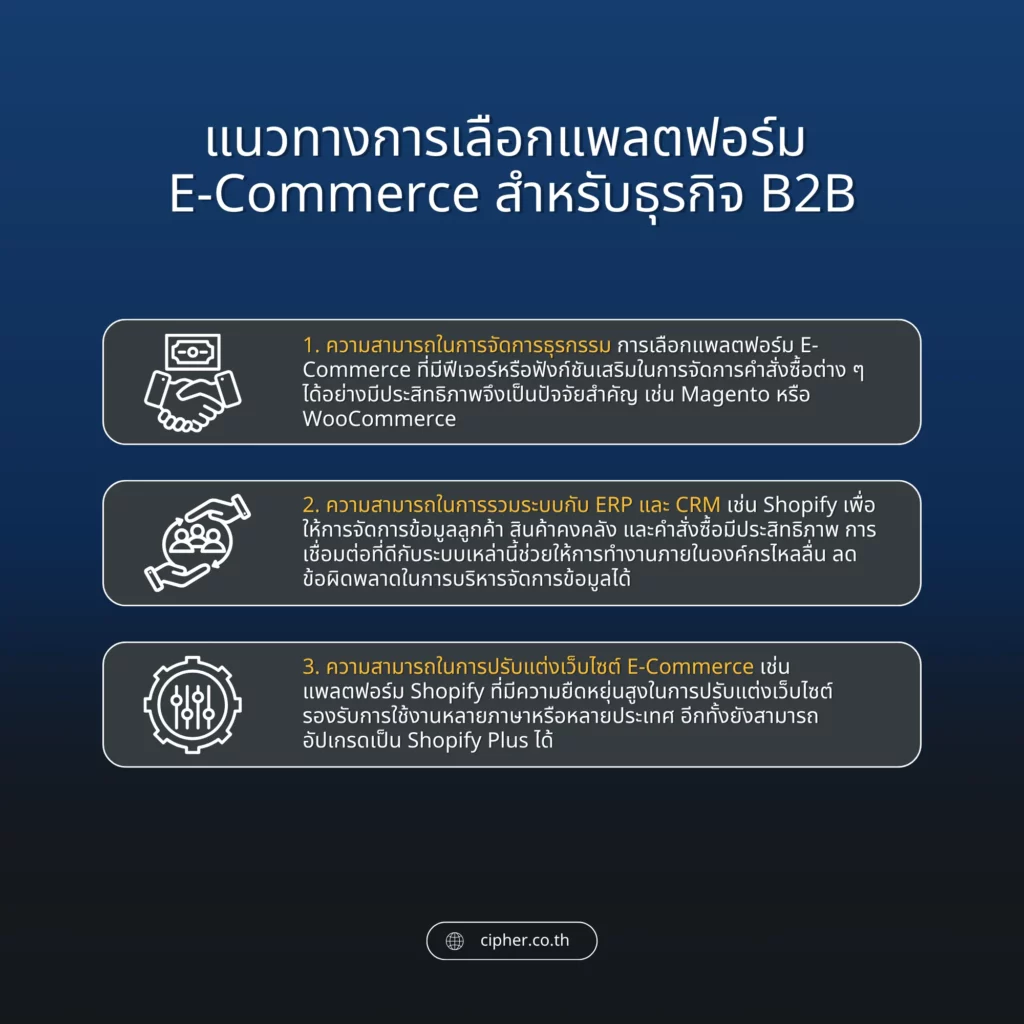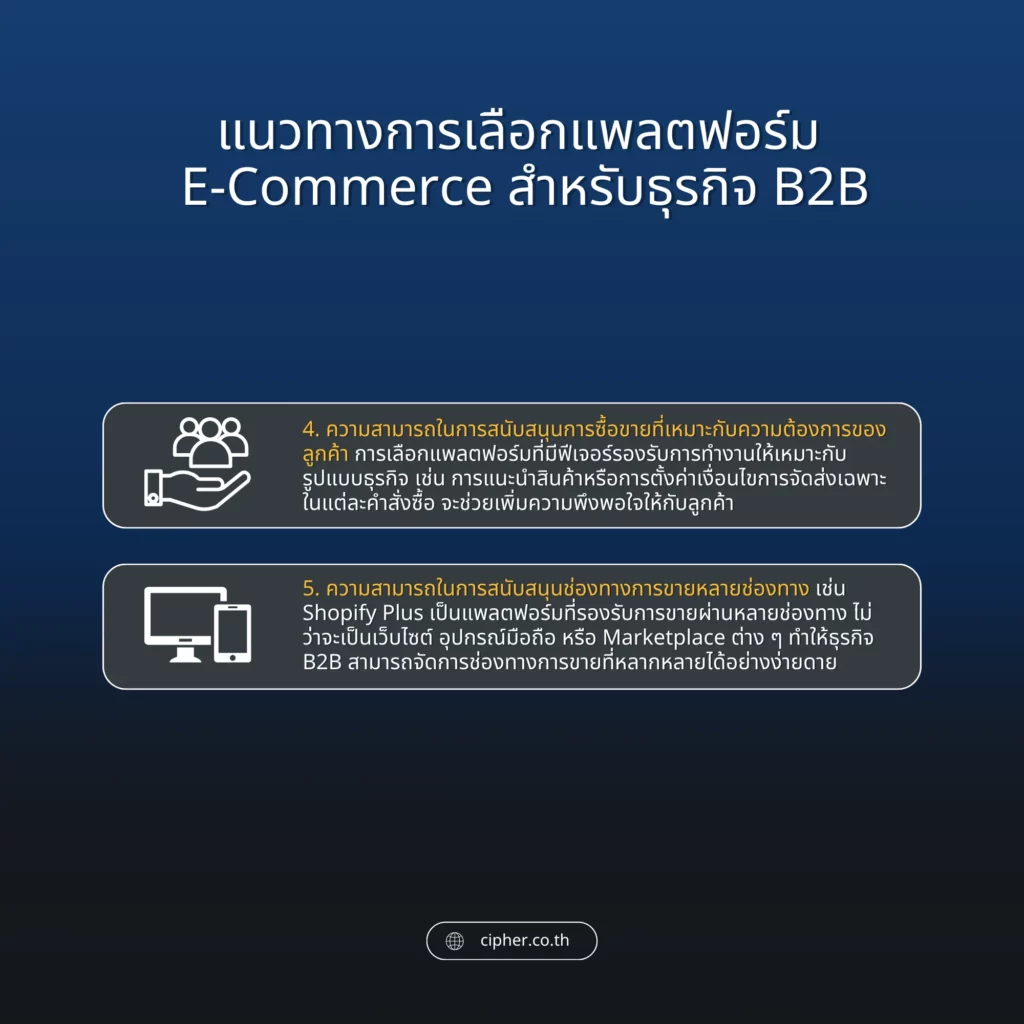Table of Contents
The selection of the right E-Commerce platform for B2B is an important factor that helps businesses grow.
Choosing the right E-Commerce platform for B2B (Business-to-Business) is one of the key factors affecting business success. Choosing a platform that fits the needs of the business not only simplifies transaction management but also enhances the effectiveness of creating a positive experience for target groups or B2B customers in this article. We will explain how to select the right E-Commerce platform for B2B businesses, specifically the features needed to support the business, and provide examples of the right platform as a decision guide.
The key factors in choosing an E-commerce platform for B2B businesses are: Anything?

- Size and Style of Business: Small businesses may choose an easy-to-use, low-cost and basic platform. If they want to support future growth, they should choose a platform that is highly flexible, customizable, and able to handle high sales volume.
- Budget: Each platform will have a different payment plan, should compare prices and features received, and should also consider additional costs such as payment fees, installation services and maintenance.
- Feature requirements: For example, are there many products or types of products? Do you want to set different prices for each customer group? Or if there are target groups or overseas customers, features that support a variety of currencies should be managed and effective transportation management should be done.
- Customization: Brand image is important, so choosing an E-Commerce platform that can tailor a website to the brand image can help make businesses more professional and reliable and create recognition.
- Support: Choose an E-Commerce platform with support teams available at all times or a company with experienced developers and service capabilities.
E-Commerce Platform Selection Guidelines for B2B Businesses

1. ability to handle transactions
B2B businesses are complex in order management or bulk business. Choosing an E-Commerce platform with enhanced features or functions to manage orders efficiently is a key factor, such as customer-based pricing or bulk discounts. As well as setting up special offers for different types of customers to help businesses better meet their needs.
For example, Magento or WooCommerce is a platform that meets the B2B business requirements. It provides flexible customer-level pricing and tender options to suit the needs of each group of customers.
In addition, B2B businesses often manage critical financial and customer information. Therefore, it is essential to choose a platform with high security standards and meet cybersecurity requirements such as Payment Card Industry Data Security Standard (PCI DSS).
2. Integration capabilities with ERP and CRM
One of the key choices for B2B businesses is to integrate the E-commerce platform with other systems such as Shopify, Enterprise Resource Planning and CRM (Customer Relationship Management) to enable efficient customer, inventory and order management. Good connectivity to these systems helps streamline internal operations, reducing errors in data management.
3. E-Commerce website customization capabilities
B2B businesses often require specific designs and features. Choosing a highly flexible platform to customize both the front-end and back-end enables businesses to create a positive customer experience and make it easy to change the features they want as they grow. The Shopify platform It is a highly flexible multilingual or multilingual web customization platform that allows businesses to effectively adapt to the needs of each region and choose the Shopify Implementation Service to upgrade to Shopify Plus for future business growth.

4. Ability to support transactions tailored to customer needs
In the B2B market, it is important to build a customized trading experience for each customer because B2B customers often need products and services that meet their business needs. Choosing a platform that supports the business model, such as introducing products or setting specific delivery conditions for each order, will increase customer satisfaction.
5. Ability to support multiple sales channels
Today’s B2B business is not limited to web-based sales, but also to support other sales channels such as Marketplace sales or Point of Sale. Therefore, choosing a platform that integrates all sales channels increases customer access and business management efficiency.
For example, Shopify Plus is a multi-channel platform that allows B2B businesses to easily manage a variety of sales channels and meet the needs of B2B customers who want to access their products through multiple channels.
Conclusion
Choosing the right E-Commerce platform for a specific B2B business requires choosing the right E-Commerce platform for both customization and application features. For businesses that want to leverage their online competitors or increase sales of B2B business, E-Commerce can contact E-Commerce experts. For B2B business, that’s a lot of talent and experience now!





